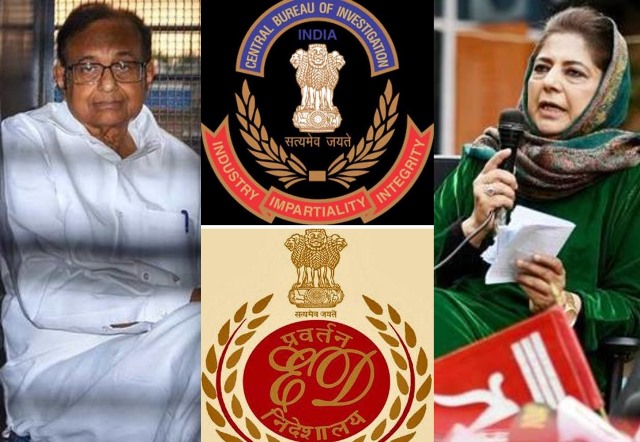Last month the Jammu & Kashmir People’s Democratic Party (PDP) president and former chief minister Mehbooba Mufti said the Centre was “weaponising” central investigating agencies such as the Central Bureau of Investigation (CBI), National Investigation Agency (NIA), and the Enforcement Directorate (ED) by using them to probe and harass her, her friends and family, and her party leaders. She scathingly remarked that the ruling regime, led by the Bharatiya Janata Party (BJP), was using these agencies as its “mistresses” to target her and her party.
Jammu and Kashmir is now administered as a Union Territory under the terms of Article 239A (which was initially applied to Puducherry is now also applicable to the Union Territory as per The Jammu and Kashmir Reorganisation Act, 2019) of the Constitution of India. Before that Act was passed, J&K was administered by a coalition government that was formed by an alliance of the PDP and the BJP. That alliance was ill-fated and in June 2018, it broke down, leading J&K back to Governor’s Rule.
Ms Mufti’s remarks alleging that the Centre is using the government’s investigation agencies to target the ruling regime’s political opponents is not an isolated one. This is not the first time that CBI, NIA, ED, and other central investigative agencies have been accused of being used politically by ruling regimes in India. The CBI is India’s premier investigating agency and functions as a national investigating and security organisation as well as an intelligence agency; the NIA acts as the Central Counter Terrorism Law Enforcement Agency; and the ED is a law enforcement agency and economic intelligence agency that is responsible for enforcing economic laws and fighting economic crime in India.
Targeting political rivals or opposition leaders by using the services of such agencies is not new in India. Successive ruling regimes have been observed to have done it. However, the rising concerns are about the alleged spread of the practice since 2014 when the incumbent BJP-led coalition came to power at the Centre and, subsequently, was re-elected in 2019. The BJP’s clearly-stated objective is not only to make India emerge as a country “freed of the Congress” (Congress mukt Bharat, in Hindi) but also to wrest control in as many of the Indian states as it can. So, its political rivals include, not only a national party such as the Congress, but also several regional parties that hold sway in the states.
ALSO READ: Press Freedom Is A Myth In India
The first of the apparently politically-motivated actions by investigating agencies during the BJP-ruled regime began early. Soon after the BJP-led coalition came to power in 2014, investigative agencies swung into action. There were raids at the Delhi chief minister (and vocal opponent of the BJP) Arvind Kejriwal’s office; and old cases against Uttar Pradesh’s Samajwadi Party leader Akhilesh Yadav and Bahujan Samaj Party president Mayawati were revived. In 2019, just before the general elections, the CBI raided the Kolkata police commissioner’s office without a warrant in what was an action quite clearly directed at undermining the Trinamool Congress’ Mamata Banerjee who is the chief minister of West Bengal and also a huge critic of the ruling regime at the Centre.
The list of such political targeting by investigative agencies is long. In 2019, former Haryana chief minister, Bhupinder Singh Hooda, faced raids in connection to old cases of alleged corruption in land deals; Congress MP and political secretary to Sonia Gandhi, Ahmed Patel (who passed away in 2020) was linked to a money-laundering scheme in Gujarat; and the homes of leaders close to the Biju Janata Dal leader and Odisha chief minister Naveen Patnaik were raided before panchayat elections in that state. These are only a few examples of what Indian political parties, particularly those who oppose the BJP, call “political vendetta” against them. Last month, when the ED summoned a Shiv Sena leader’s wife in Mumbai for questioning in connection with a bank fraud, the party’s workers put up a banner in front of the city’s ED office, which proclaimed that it was a BJP office.
ALSO READ: Is Maharashtra A Wake Up Call For BJP?
It should not be anybody’s case the charges that are levelled by the investigating agencies against opposition politicians are rigged or false. Some (or perhaps, even all) of them may have some basis for investigation. But it is the concerted manner in which the agencies are used that is of concern because it smacks of government interference in the role of the agencies that are supposed to be autonomous and apolitical.
One of the most high-profile cases was the one involving former finance minister P Chidambaram in 2019. He was accused of being involved in the INX Media scandal. Chidambaram was charged with allowing an irregular transfer of overseas funds to the media company. Chidambaram was arrested and the CBI tried to extend his custody many times. But that case has now gone nowhere.
That is the other thing. Many of the cases on which investigative agencies have based their actions against opposition political leaders have either died down, reached a dead-end, or not been pursued after the initial raids, arrests, and so on. While that could reinforce the opposition parties’ allegations that the ruling regime is using the agencies for political vendetta, the more serious issue is about what such a practice could do to the reputation and autonomy of India’s central investigating agencies, which are, by law, meant to be non-partisan, apolitical, unbiased, and independent. If these institutions and their functioning are prone to political interference, not only will their functioning be eroded but Indians will lose their faith in the establishment and its ability to function without fear and favour.
